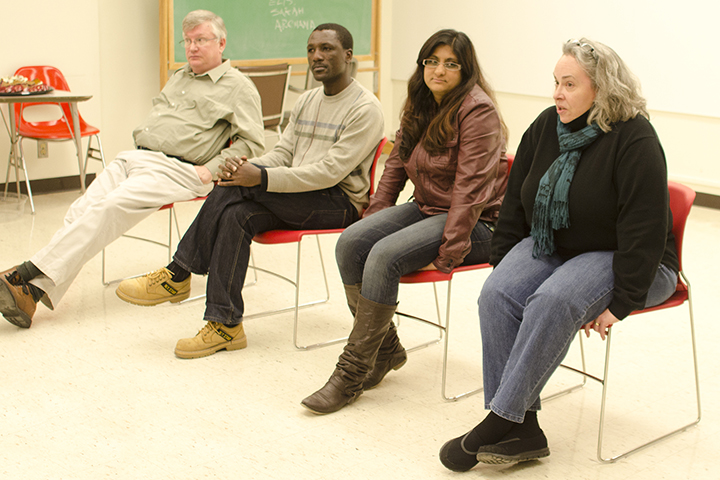The creators of the documentary Stateless spoke April 12 at the Center for the Visual Arts after a screening of the film: Scott Erlinder, Mutuyimana Manzi, project editor Priya Yavagal, and Ginger Scott-Erlinder ’87.
In 1994, Hutu extremists within and outside of the Rwandan government and tens of thousands of collaborators slaughtered an estimated 800,000 Tutsis and fellow Hutus during a genocidal campaign that lasted about 100 days. The genocide only ended when a Ugandan-based rebel army dominated by Tutsis, the much smaller of the country’s two ethnic groups, invaded Rwanda and took over the country.
The Rwandan Patriotic Front, led by Paul Kagame, has held sway over Rwanda ever since. Some have heralded Kagame, claiming he has brought a semblance of economic prosperity and democratic stability to the tiny country in Central Africa. But his government has also been criticized for massacres of Hutu refugees, for its central part in two wars in Congo that claimed millions of lives, and for the alleged misuse of laws that outlaw the promotion of genocidal ideology to eliminate legitimate dissent by Hutus and Tutsis.
Theater alum Ginger Scott-Erlinder ’87 and her husband, Scott, pick holes in the former and show the latter, much darker picture in a 46-minute documentary they debuted Friday, April 12, at the Center for the Visual Arts for a crowd of about a dozen students, staff, and community members.
“The country is not as successful as people say it is,” Scott said. “It really is a police state.”
The film, titled Stateless, focuses on the United Nations plan to strip Rwandans who fled the country before 1998 of their refugee status. By July 2013, under what is called the cessation clause, the refugees must acquire residency status in the countries where they live, which are mostly neighboring African countries like Uganda, or return to Rwanda.
The documentary argues that the refugees are being forced back to Rwanda, a country where they don’t feel safe.
“And really that is not right,” Ginger said.
The film was originally started with some of Scott’s former students at DePaul University, where he teaches. He ended up directing the film, which is the second documentary released by the couple’s company, Seiche Entertainment Ltd.
“This was not something we intended to make,” said Ginger, a Towanda native who lives in Chicago and was the documentary’s producer. “But we felt it was a message that needed to get out.”
The genocide happened within the context of a war that started in 1990 when the Rwandan Patriotic Front invaded Rwanda. The invasion caused economic collapse and sent more the 1.5 million Rwandans fleeing the fighting, according to Scott. Most ended up as internally displaced people living in squalid camps throughout Rwanda, he said. The economic collapse and the invasion raised long-prominent ethnic tensions that would be unleashed in 1994.
The documentary uses interviews and secondary and firsthand footage to show what has happened in Rwanda in the past 20 years. The film argues that Rwanda is a country gripped by fear and controlled by a small Tutsi elite. It also questions why the U.N. would want to return the refugees when the economic, political, and security conditions are such that the clause should not be invoked.
The film focuses on the killing and jailing of opposition politicians. It also features interviews with human rights activists, refugees, humanitarian workers, and political opponents of Kagame. Among those interviewed is Paul Rusesabagina, whose role in protecting hundreds of people during the genocide was dramatized in the movie Hotel Rwanda.
Rwandan refugee Mutuyimana Manzi recorded much of the footage in Uganda and was interviewed for the documentary. With the Erlinders’ help he has been able to move to the United States where he is studying at DePaul University.
Manzi, who has had relatives killed by Kagame’s forces, explained how ethnic discrimination continues in the country.
“What we want is a democratic country,” he said.
Scott became involved in the Rwandan issue after his brother Peter, a lawyer, was jailed for three weeks in 2010 on a charge of genocide denial while he was in Rwanda defending an opposition candidate. Scott said Kagame’s regime wants refugees to be returned in order to keep any enemies in the country where it can control them.
Ginger hopes the documentary leads to action, specifically stopping the cessation clause deadline and stopping the push of sending people back to a country to which they don’t want to return.
Kevin Bersett can be reached at kdberse@ilstu.edu.


How can we get hold of this documentary?
Hi Emmanuel: You can watch the entire documentary online: http://www.stoprwandacessation.org/Home.html